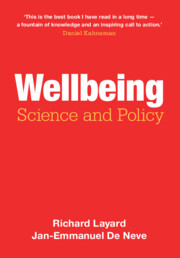Wellbeing
What produces a happy society and a happy life? Thanks to the new science of wellbeing, we can now answer this question using state-of-the-art empirical evidence. This transforms our ability to base our decisions on the outcomes that matter most, namely the wellbeing of us all including future generations. Written by two of the world’s leading experts on the economics of wellbeing, this book shows how wellbeing can be measured, what causes it and how it can be improved. The findings of the book are profoundly relevant to all social sciences, including psychology, economics, politics, behavioural science and sociology. This is the first field-defining text on a new science that aims to span the whole of human life. It will be an invaluable resource for undergraduate and graduate students, as well as policymakers and employers who will be able to apply its insights in their professional and private lives. This title is also available as Open Access on Cambridge Core.
Richard Layard is a leading British economist, who thinks society’s goal should be the wellbeing of the people. His landmark book Happiness: Lessons from a New Science has influenced policymakers worldwide. He is cofounder of Action for Happiness, of the World Happiness Report and of the World Wellbeing Movement. In 2020, he was awarded the Lifetime Achievement Award by Britain’s Economic and Social Research Council.
Jan-Emmanuel De Neve is a Belgian economist and professor at the University of Oxford where he directs the Wellbeing Research Centre. He is best known for his research on the economics of wellbeing, which was selected among ‘The Management Ideas that Mattered Most’ by Harvard Business Review, and he was awarded the Veenhoven Award for his contributions to the scientific study of happiness. He is an editor of the World Happiness Report and cofounder of the World Wellbeing Movement.

